|
|
|
Sort Order |
|
|
|
Items / Page
|
|
|
|
|
|
|
| Srl | Item |
| 1 |
ID:
105194
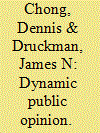

|
|
|
|
|
| Publication |
2010.
|
| Summary/Abstract |
We develop an approach to studying public opinion that accounts for how people process competing messages received over the course of a political campaign or policy debate. Instead of focusing on the fixed impact of a message, we emphasize that a message can have variable effects depending on when it is received within a competitive context and how it is evaluated. We test hypotheses about the effect of information processing using data from two experiments that measure changes in public opinion in response to alternative sequences of information. As in past research, we find that competing messages received at the same time neutralize one another. However, when competing messages are separated by days or weeks, most individuals give disproportionate weight to the most recent communication because previous effects decay over time. There are exceptions, though, as people who engage in deliberate processing of information display attitude stability and give disproportionate weight to previous messages. These results show that people typically form significantly different opinions when they receive competing messages over time than when they receive the same messages simultaneously. We conclude by discussing the implications of our findings for understanding the power of communications in contemporary politics.
|
|
|
|
|
|
|
|
|
|
|
|
|
|
|
|
| 2 |
ID:
178390
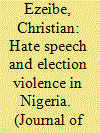

|
|
|
|
|
| Summary/Abstract |
Although research has considered how poor governance, exclusionary politics and electoral malpractice affect election violence, the effect of hate speech on election violence has not received adequate academic attention. Using a mixed methods approach with qualitative dominance, this study examines the effect of hate speech on election violence in Nigeria during the 2011, 2015 and 2019 presidential elections. The article demonstrates that an entrenched culture of hate speech is an oft-neglected major driver of election violence in Nigeria. The study concludes that the implementation of existing anti-hate speech laws presents an opportunity for protecting the rights of minority groups, promoting political inclusion and preventing election violence in Nigeria and beyond.
|
|
|
|
|
|
|
|
|
|
|
|
|
|
|
|
| 3 |
ID:
109014
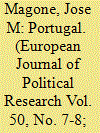

|
|
|
| 4 |
ID:
175956
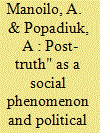

|
|
|
|
|
| Summary/Abstract |
IN RECENT YEARS, an interest in the post-truth phenomenon has spread far and wide into political and other social sciences. On the whole, it is related to the process of psychological impact on human consciousness and subconsciousness, in the course of which people might radically change their opinion about any important social or political event that has already taken place. This happens under an impact of reinterpretation of previously disregarded events or their details. The public is offered interpretations that occupy information space and penetrate public consciousness; they are accompanied by fakes disguised as verified news, or inventions and rumors presented as versions, opinions of respected "experts," "fashionable" bloggers and journalists entrusted with the task of planting "post-truths" in the collective mind of target audiences and individual minds of each of its members. The collective opinion changed by "post-truth" might change individual positions of citizens.
|
|
|
|
|
|
|
|
|
|
|
|
|
|
|
|
| 5 |
ID:
132040
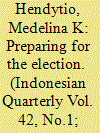

|
|
|
| 6 |
ID:
096939
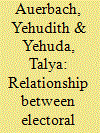

|
|
|
|
|
| Publication |
2010.
|
| Summary/Abstract |
This study explores the effects of changes in electoral systems on political marketing, and, more particularly, the impact of the shift from the parliamentary electoral system which has been in operation in Israel since 1948, to the presidentary (combined of elements from the parliamentary system, and the presidential system) on the two largest Israeli parties' marketing strategies. Out of 670 political broadcasts by Likud and Labour, 207 were examined for five out of the six electoral campaigns that took place since 1988: the 1988 and 1992 campaigns, before the switch to the presidentary system, the 1996 and 1999 campaigns after the establishment of the combined system and the 2003 campaign, after Israel changed back to the parliamentary electoral system. The findings supported the study's main arguments regarding the extent and direction of the impact of the change in the electoral system on the developments in political marketing. Beginning in 1996, there was a decrease in broadcasts presenting political issues and a sharp increase in broadcasts that focus on personality alone. Equivalently, the percentage of broadcasts addressing the centre of the political map, rather than distinct publics, grew significantly. In 2003, with the return to the parliamentary system, the marketing strategy of the two parties, and more particularly of the Labour Party, changed back to the pre-1992 pattern: a large percentage of the broadcasts focused on issues and not on the candidates' personalities, and addressed distinct target audiences rather than the centre.
|
|
|
|
|
|
|
|
|
|
|
|
|
|
|
|
| 7 |
ID:
131691
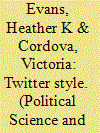

|
|
|
|
|
|
|
|